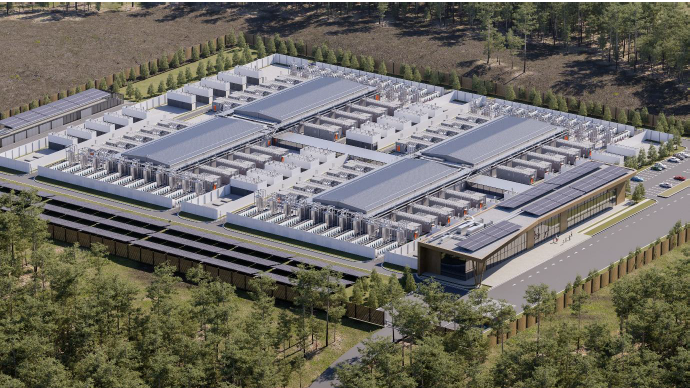AI industrial park in Irvine 'could bring £15bn investment'

AI Pathfinder previously announced plans for a data centre which will be based in Chelveston, Northamptonshire
- Published
Irvine has been chosen as the location for a major investment in artificial intelligence (AI), which its backers say could reach £15bn and create a "substantial" number of jobs.
The plan for an AI industrial park is being welcomed by North Ayrshire Council, describing it as "hugely significant" and "transformational" for the area's employment.
It has been set out by AI Pathfinder, a subsidiary of a London-based property development company Salamanca, led by entrepreneur Martin Bellamy.
While it has a limited track record in AI, it intends to build infrastructure for other companies to use, similar to the internet cloud.
New AI factory to take 'complex' healthcare work
- Published20 September
AI Pathfinder has another plan for a £1bn investment in Northamptonshire, announced by the UK government this week as part of a vast AI investment programme linked to the state visit by President Donald Trump.
The plan for the i3 industrial park in Irvine is to spend an initial £385m, starting next year.
According to a statement from AI Pathfinder, this is "part of their ambition for the site to become one of the largest AI infrastructure hubs in Europe.
"As part of this long-term vision, AI Pathfinder is looking to invest £15bn at the i3 site in North Ayrshire."
The media statement adds: "Their investment in the west of Scotland is expected to create substantial employment opportunities, both through the delivery of the site's construction and in the diverse range of skilled roles that will support its long-term operation."
Benefits for Ayrshire and beyond
Councillor Tony Gurney, North Ayrshire Council's cabinet member for the economy, said: "This is a hugely significant announcement and we recognise the enormous potential this offers our area, placing it at the vanguard of the AI revolution.
"We stand ready to become Scotland's leading innovation and industrial investment region, delivering high-value AI at pace.
"The scale of this investment will be transformational for our young people and residents.
"It offers the chance to establish a local skills pipeline across construction, engineering, digital infrastructure, and data centre operations and will deliver major supply chain benefits which will ripple across Ayrshire businesses and beyond."

The numbers look unbelievably large, with a total of £150bn announced already this week, and now a further £15bn for Ayrshire.
So should we believe them? As the investment announcements arrived with Donald Trump on his state visit, they probably deserve some scepticism. It's not just the US president who sometimes inflates figures when he prefers to go "bigly".
Yet even if the investment is a fraction of that, it shows something very significant is happening in the economy. And if the US giants are investing at scale into the UK, it looks a very positive sign for the economy's future.
For the benefit of Scots, the UK government's Department of Business and Trade set out the implications north of the border.
These include CoreWeave working with British firm DataVita in Airdrie to build "one of Europe's largest, most efficient AI data centres".
It goes on: "BlackRock will open a new Edinburgh office this month, expanding its local workforce from 800 to 1,400 ,and potentially adding an additional 500 roles across its UK team.
"Once complete, two of its five largest global offices will be based in the UK."
And there's more: "Amentum has announced a £150m investment in the UK, with over 3,000 new jobs to be created—boosting its UK workforce by more than 50% over the next four years.
"The company has highlighted Glasgow as one of the sites it will seek to grow, supporting the city's growth as a centre for skilled employment and innovation."
Why all this investment now?
These are not the household names that were in the headlines earlier this week, as Google, Nvidia and Microsoft outlined their British investment plans. But as with AI Pathfinder with its plans for Ayrshire, the AI revolution brings new tech companies.
So what's going on? Well, Artificial Intelligence is in the early stages of an anticipated revolution in the economy.
On this evidence, the UK is seen as a good place to base a lot of its infrastructure. It has technical skills, some of those at Scottish universities, a safe political environment, and it puts at least some of the data out of the reach of future US or EU regulation. UK ministers insist there are few strings attached to the US investments this week.
The processing of so much data requires enormous investment, and in turn, data centres require enormous amounts of energy. That has driven the push for more nuclear power developments south of the border.
While the UK government and trade unions want the Scottish government to lift its block on new nuclear power, Scotland's contribution to this sector could be from wind power.
Indeed, there's a case for placing data centres close to Scotland's future offshore wind farms, both because the air is cooler than in the south, so less energy is needed to keep processors from overheating, and because it would reduce the need for expensive and unpopular grid connections to get that wind power to customers in England, Wales and beyond.
However, there are other factors that determine where data centres are located. Users of that data want superfast response times, for instance for high-frequency financial trading in London. For them, proximity makes a difference, even if it's measured in fractions of a second.